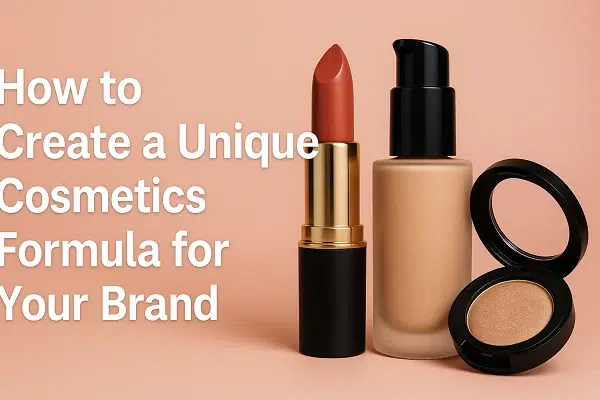So what are the essentials of a cosmetic business plan? And is there a right formula for developing a good beauty brand plan?
Table of Contents

The cosmetics industry has shown great potential, from skincare to makeup and even makeup techniques.
More niche market cosmetics are appearing, and now would be a good time to start and grow a beauty brand.
But like any other company, launching a cosmetics business demands careful planning. Entrepreneurs must, therefore, develop and execute a business plan.
The information below provides insight into creating a good plan that will be effective in starting a cosmetics store or business.
Why Your Beauty Business Needs A Plan
A business plan is an important part of starting and growing a brand. And though the cosmetics industry may look easy to venture into, potential entrepreneurs must develop a good business plan that caters to the specifics of their cosmetic business. Here are the primary reasons why every entrepreneur needs a cosmetics business plan:
To Outline Financial Projections and Needs
A key part of starting a cosmetics business is determining where funds will come from and how the business will perform financially.
A cosmetic business plan often outlines the financial projections and needs of a business so the entrepreneur can have a clear idea of the possibilities.
With this information, entrepreneurs cna determine where to get funding and the most practical business goals.
To Determine And Minimize Risk
Most entrepreneurs admit there is so much unknown when starting a cosmetics business. There is much to learn about the market, competitors, operations, etc.
But that’s the risk of business. Luckily, business owners can reduce the risk by developing a business plan.
Once the idea is on paper, involved parties can better see any assumptions and flaws that can be rectified to reduce risk. A cosmetics business plan can help entrepreneurs move forward confidently.
To Identify Potential Problems, Early

A good business model can help entrepreneurs catch flaws or problems with their predictions or assumptions.
Again it all comes down to putting the idea on paper. Once it is structured and arranged, the business owner can find challenges in their operations plan, marketing strategy, cash flow, sales models, etc.
Starting the business sounds simple, but a marketing plan outlines how extensive and challenging it can be.
The entrepreneur can then take action to solve the problems or at least prepare adequately for when the issue materializes.
To Force You Into Market Research
What is the business’ target market? What kind of consumers do you need to build the brand? Do the target customers have a disposable income to purchase products?
Will they be there as the business grows? Where and how will you market to them? Are there other cosmetics brands winning the customer segment?
These are important questions all entrepreneurs must answer when starting a cosmetics business.
Creating a cosmetic business plan forces the business owner into market research, which helps outline goals, develop products, and create a good marketing plan.
To Create An Effective Marketing Plan
A good marketing plan is a key part of starting a cosmetics company. It is the strategy the business will use to reach clients in the cosmetic industry.
A business plan ensures that the entrepreneur also creates an effective marketing plan to reach consumers on the platforms or media they use the most.
To Clarify the Vision For the Parties Involved
Entrepreneurs must have a clear vision and goals to create a successful cosmetics business. That is why creating a business plan demands a vision statement, objectives, mission, etc.
These aspects define the purpose of the cosmetics business, the personnel’s roles, and the business’s future.
In short, a cosmetic business plan establishes the company’s long-term vision and who will help get it there. It goes a long way in getting the current team in sync and working towards the same goal.
To Set Business Goals
It goes without saying, but every cosmetics business needs goals outlined in the business plan. Business owners must ask themselves what they want to achieve through the business.
They must break them down into primary and secondary goals, plus short and long-term goals.
It again helps to align the team and predict company growth. Entrepreneurs should also set practical deadlines for achieving goals. Over time, these goals guide business strategy.
To Help Gather Funding

A cosmetics business plan helps entrepreneurs determine how much capital they need to start the business and run operations.
So if they need outside funding, the cosmetic business plan outlines how much they must advocate for.
Potential investors, bank loans, and donors are often more inclined to provide funds if they have proof of a well-thought-out plan.
Some ask for a financial plan before giving funds. So if the entrepreneur plans on sourcing exterior funds, a good business plan shows professionalism and aids negotiations.
To Understand Staffing Needs
Business planning helps entrepreneurs realize that they may be over or understaffed.
The business plan is a roadmap for staffing needs, outlining duties or key roles needed to start and grow the business.
It can ensure entrepreneurs enter the beauty industry with enough people to keep things running.
To Find New Business Opportunities
Finally, the brainstorming, planning, interviewing, and problem-solving processes of creating a business plan help to view the cosmetic business in a new light.
The cosmetics business plan can help the entrepreneur develop a new retail strategy, find an untapped market, create more impactful products, etc.
Essentials of a Cosmetics Business Plan
All good cosmetic business plans must have the following key parts:
Executive Summary
An executive summary is an overview of the whole business plan. It summarizes and highlights what the cosmetic business plan will cover. Business owners should write the executive summary last to cover the whole plan.
Company Overview
The company overview is a description of the cosmetic business. The company overview includes business details, including products, target customers, niche, when the company started, why the business started, milestones achieved, etc.
Market Analysis
A cosmetic business plan should have a market analysis. This section provides an overview of the cosmetic industry. It helps prove that the entrepreneur is an expert in the industry.
In addition, it helps the entrepreneur discover information about the industry. A market analysis also outlines the company’s primary target customers and where to find them.
Marketing Plan
The marketing plan outlines how the business plans to promote and sell products and services.
A good marketing plan typically includes the four Ps: Product, Promotion, Price, and Place. Entrepreneurs should expound more on these elements covering pricing plans, unique selling points, etc.
Management Organization
The section outlines the details of the organization’s management and strategy. It should introduce company leaders, their qualifications, and their responsibilities. It can also outline the company’s legal structure, human resources, and advisory board.
Product Range Description
The product description section includes details of the products. Entrepreneurs should include details of the cosmetics products, including manufacturing strategy, how long the products will last, what problems they solve, and how much they may cost to produce.
Competitive Analysis

The competitive analysis identifies other cosmetics businesses and brands competing with the cosmetic business.
The section should outline a comparison of competitors’ strengths and weaknesses. The section can also mention any competitive advantage the cosmetic business may have and how it differs from other cosmetic companies.
Operations Plan
The operating plan explains how the company plans to achieve its goals. The operation plans should include everyday short-term processes and what they will achieve, plus the long-term processes and milestones they will achieve.
Financial Plan
A cosmetic business plan should always include a 5-year financial strategy. The financial projections plan should be monthly or quarterly for the starting year and then yearly after that. A good financial plan includes financing sources, income statements, cash flow statements, and balance sheets.
Appendix
Finally, the appendix includes supporting documents that make the plan more professional and compelling to potential investors. It can include documents for market research, business permits, legal documentation, pictures of products, management resumes, etc.
How To Write A Compelling Cosmetic Business Plan
Create a mission and vision statement
The mission and vision statement outlines plans for the future of the company. It makes it easier to identify company goals or the primary reason the business needs to start.
The statement should be clear and easy to understand, making investors and customers feel like the brand can solve a problem or make a difference.
Determine your specialization
A cosmetic business should develop and state its specialization. The cosmetic industry allows for multiple specializations, such as:
- Kids cosmetics
- Niche market cosmetics
- Beauty influencer or makeup artist.
- Elderly skincare
- Men’s makeup
- Athlete’s cosmetics
There are many untapped niches in the cosmetic industry. Choosing a unique one can set the brand apart.
Identify the target market and their characteristics
A key part of writing a cosmetic business plan is determining the target audience and their characteristics.
Entrepreneurs should determine who would most benefit or be inclined to purchase the brand’s cosmetic products.
Business owners should also write their attributes such as age, financial background, gender, beliefs, sustainability concerns, likes, dislikes, etc.
Determine and describe your cosmetic products
What kind of products will the cosmetic business sell?
Businesses can provide consumers with a range of beauty products, including creams, skincare products, makeup products, exfoliators, body lotions and butters, and hair products.
Specialization is preferable as it narrows the target audience and helps set realistic goals. Describing the products can also help in formulating effective marketing and sales strategies.
Research your competitors
Entrepreneurs should identify and research competitors. The section should include information on direct competitors, i.e., other cosmetic businesses, and indirect competitors, i.e., other purchasing options not directly competing with the cosmetic business.
Entrepreneurs should outline the competitors’ strengths and weaknesses, pricing system, niche, marketing strategy, types of customers they serve, and what consumers like or dislike about them.
Develop a manufacturing strategy
Entrepreneurs must determine how their cosmetic business will produce, package, and brand the products.
There are many manufacturing options, including self-production, contracting, and partnering with private labels.
Entrepreneurs should determine the pros and cons of every strategy and its implications on aspects such as distribution, financing, and shipping.
The best manufacturing strategy is affordable and supportive of the supply chain.
Create a sales strategy
The sales strategy is how the cosmetic business plans to sell to customers. Often the options are split into online or physical stores.
The target market often determines where the cosmetic business will sell best. Younger consumers are online, so websites or social media platforms work best.
But with this choice, entrepreneurs should consider shipping and delivery needs. Older consumers prefer physical stores, but they demand considerations such as rent and utilities.
Outline your financial forecasts

Entrepreneurs must outline the financial needs of the cosmetic business adequately.
Manufacturing, advertising, branding, packaging, shipping, renting, design and development, and miscellaneous financial needs must appear on the plan.
These financial considerations are necessary to determine if the expected financial predictions would break even, if not yield profits.
Create a funding plan
It is always necessary to create a funding plan for the cosmetic business. A funding plan is a solution to financial gaps.
It also outlines the various options the cosmetic business has for capital. A funding plan helps entrepreneurs gather the documents they need to present to banks or potential investors. Finally, it can help eliminate unnecessary costs.
Analyze and tweak the plan
Entrepreneurs must finally analyze and adjust the cosmetic business plan based on feedback from other business owners and professionals in the industry.
Another set of eyes can help identify weaknesses, areas of opportunity, inconsistencies, and parts that need further clarification.
Or download a template
The internet is full of business plan templates that can ease the process.
However, entrepreneurs should recognize that the probability of finding a cosmetic business plan that caters to their exact needs is unlikely.
Therefore, they should brace for much editing to match business specifications.
Alternatively, hire a service
Lastly, cosmetic business entrepreneurs can hire a service provider to write the business plan. Hiring a professional service can result in an effective and fool-proof business plan ideal for presentation to the bank or a potential investor.
However, good business plans are not cheap, so entrepreneurs should be ready to invest in quality.







